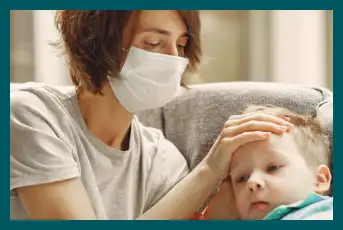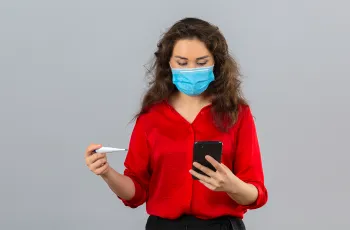How to Break a Fever in Adults? Management and Home Treatments
Written by Dr Nelson Lau, MBBS FRACGP, GP & Digital Health Specialist. Blog updated on 27 November 2025 and Blog published on 17th June 2025

Contents

Overview
The experience of waking up with heat and discomfort and body pain makes for an unpleasant day. Your body uses fever as a defense mechanism to fight off infections although it causes you discomfort. The following guide explains what a fever is and basic home treatment methods for adult patients.What Is a Fever?
Your brain's hypothalamus functions as the internal body temperature control system. Your body increases its temperature when it detects an infection. The increased body temperature creates conditions that make it harder for pathogens to survive while your immune system performs its defense functions. A fever exists as a body response to infection rather than being an illness by itself because it indicates your body is fighting against an infection.Causes
A fever is your body's way of creating an inhospitable environment for viruses and bacteria. It can be triggered by various factors, including:- Viral infections: such as the flu, COVID-19, or the common cold.
- Bacterial infections: like strep throat or pneumonia.
- Inflammatory conditions: such as rheumatoid arthritis or Crohn's disease.
- Immunisations or vaccinations.
- Certain medications or treatments: like chemotherapy.
Symptoms
A fever exists as a single symptom which appears by itself. Your body experiences two main symptoms when you have a fever. Your body attempts to achieve its new temperature goal through chills and shivering. Your body uses fever to fight infections which results in body pain and headaches. Your body also uses sweating as a mechanism to lower its temperature after the thermostat returns to normal. And finally, your body requires rest and fluids because your immune system works at maximum capacity to fight infections.Treatment at home
If you’re a generally healthy adult dealing with a mild fever, there are several effective home remedies you can try:- Stay hydrated: Drink plenty of fluids, such as water, broths, or electrolyte-replacement therapy drinks. Dehydration can make a fever feel even worse.
- Take over-the-counter medication: Paracetamol or ibuprofen can help reduce fever and alleviate body aches and headaches.
- Dress lightly: Wear lightweight, breathable clothing and avoid bundling up, which can trap body heat and raise your temperature.
- Take a lukewarm bath or shower: The cooling effect can help bring down a high fever gradually. Avoid cold water, as it can cause shivering and raise your body temperature.
- Use a cool compress: Apply a damp, cool (not cold) cloth to your forehead, neck, or armpits to help lower your body temperature.
- Get plenty of rest: Your body needs energy to fight off the infection, so take it easy and avoid strenuous activities.
- Monitor your fever: Check your temperature regularly to ensure it doesn't rise too high or persist for too long.
Feeling unwell? Consult an Australian-registered GP online, 24/7.
Consult now
Available 24/7, across Australia.
What to avoid?
While home remedies can be helpful, there are a few things you'll want to steer clear of:- Alcohol: It can dehydrate you and interfere with your body's ability to regulate temperature.
- Aspirin: It can increase the risk of complications like Reye's syndrome in certain viral illnesses.
- Bundling up: Trapping body heat can raise your fever even higher.
Prevention Tips
Most fevers develop from infections so maintaining proper hygiene stands as your main protection against them. You should wash your hands multiple times throughout the day using soap and water or hand sanitiser. You should prevent yourself from using items that belong to someone who shows signs of illness. Maintain your vaccination schedule by following all recommended shots including the annual flu vaccine.When to consult a doctor?
In most cases, a mild fever in an otherwise healthy adult is nothing to worry about. However, there are certain situations where you should seek medical attention:- Fever over 39.4°C
- Fever lasting more than 3 days.
- Signs of dehydration: like dry mouth, dizziness, or dark urine.
- Difficulty breathing or chest pain.
- Severe headache or stiff neck or sensitivity to light.
- Rash or other concerning symptoms.
How Hola Health Can Help
A fever can be worrying — especially when symptoms escalate or don’t improve with home care. Hola Health makes it easy to get medical support quickly, without sitting in a clinic or waiting for an appointment. Here's how our Australian-registered online doctors can help:- Fast telehealth consultations: Speak with a GP online within minutes to understand whether your fever is caused by a viral illness, bacterial infection, medication reaction, or another condition.
- Personalised treatment advice: Your doctor will assess your symptoms, guide you on safe home care, and advise whether you need medication, rest, testing, or further investigation.
- Online prescriptions when appropriate: If your fever is linked to a bacterial infection or requires symptom-management medications, your GP can issue an instant eScript.
- Medical certificates for work or study: If your fever is affecting your ability to attend work or university, Hola Health can provide a same-day online medical certificate.
- Referrals for further testing: If blood tests, imaging, or specialist review are needed, our doctors can arrange referrals to pathology, radiology, or specialists.
- Support for high-risk individuals: People with chronic conditions, pregnancy, or weakened immunity often need earlier intervention. Hola Health online GP can help you decide the safest next steps.
FAQ
What temperature is considered a high fever in adults?
Adults with fevers above 38.5°C are considered to have high-grade fever. Normal body temperature ranges between 36.5°C and 37.5°C.How long does a fever usually last?
The duration of a typical viral fever in adults usually spans from two to three days. When your fever extends beyond three days you should visit a doctor for medical evaluation.Should I take medication for a mild fever?
You should avoid taking medication for treating a mild fever. Your body uses fever as a natural defense mechanism to fight infections. Rest and hydration should be your first priority when dealing with a fever. You can use paracetamol or ibuprofen to relieve severe discomfort when necessary.Can dehydration cause fever?
A fever does not result from dehydration but dehydration can occur as a side effect of having a fever which will worsen your symptoms. You need to drink enough fluids to stay hydrated.When should I see a doctor for a fever?
You should visit a doctor when your fever reaches dangerous levels or when it persists for an extended period. Seek immediate medical help when your fever reaches dangerous levels or when it persists for an extended period.Need time off to recover? Request an online medical certificate with Hola.
Request now
Available 24/7, across Australia.
Providing consult for
- Cough
- Nausea & vomiting
- Fever
- Hayfever
- Fatigue
- Sore throat
- Acne
- Gout
- Eczema
- Rosacea
- Sunburn
- UTI
- Erectile dysfunction
- Contraception
- Morning sickness
- Morning after pill
- Prostate health
- Anxiety
- Depression
- Stress
- Grief & loss
- Premature ejaculation
- Asthma
- Blood pressure
- Diabetes
- Cholesterol
- Migraines & headaches
- Allergies
- Heartburn & reflux
- Sleep disorder
- Gastro
Related Articles
Disclaimer
This blog is for general informational purposes only and does not indicate that Hola Health provides all treatments or preventive measures mentioned. It is not intended to be a substitute for professional medical advice. Always seek the guidance of your doctor or other qualified health professional with any questions you may have regarding your health or a medical condition. For emergencies please immediately contact 000. Any medical topics discussed are intended to educate, not to imply availability through Hola Health.




